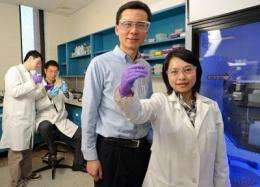New method for producing proteins critical to medical research

Scientists at the University of Delaware have developed a new method for producing proteins critical to research on cancer, Alzheimer's, and other diseases.
Developed by Zhihao Zhuang, UD assistant professor of chemistry and biochemistry, and his research group, the chemical method yields hundredsfold more ubiquitylated proteins than current approaches. Such proteins may hold the key to revealing such mysteries as how cancer cells gain resistance to cancer drugs.
The advance is reported in the April issue of Nature Chemical Biology, the leading journal in the field of chemical biology. Zhuang's co-authors include graduate students Junjun Chen and Jialiang Wang and postdoctoral fellow Yongxing Ai, all from UD, and Lajos Haracska, a researcher in the Institute of Genetics at the Hungarian Academy of Sciences.
Ubiquitin is a small protein, the basis of Nobel Prize-winning research in 2004, which deemed the molecule the "kiss of death" for its role in tagging damaged or unneeded proteins for the cell's waste disposal in the constant process of protein generation and degradation. In recent years, the non-proteolytic functions of ubiquitin in diverse cellular processes, including protein trafficking, immune response, and DNA damage tolerance, have been discovered at a rapid pace, and it has become clear that ubiquitin plays far-broader roles in cell biology.
However, preparing sufficient samples of ubiquitylated proteins for study has been a major challenge facing scientists.
The availability of these proteins is critical for Zhuang and members of his research team, who are working at the interface of chemistry and biology trying to understand the molecular basis of human cancer development and prevention.
The new method for developing ubiquitylated proteins, which Zhuang and his team developed, combines the power of intein chemistry and disulfide crosslinking to bond ubiquitin to another essential protein called proliferating cell nuclear antigen.
"Our yield is hundredsfold higher compared to the commonly used enzymatic approach," Zhuang says. "We also have the flexibility of modifying the selected residues, which has not been possible with the previous approach."
In investigating the effect of the differently modified proteins, Zhuang and his group also revealed a surprising phenomenon regarding ubiquitylation.
"We found that ubiquitin as a protein modifier is far more flexible than we have thought. This property distinguishes ubiquitylation from other better studied protein post-translational modifications, such as phosphorylation and acetylation," Zhuang says.
The new UD approach will help researchers studying ubiquitin biology by providing the means to prepare milligrams of protein samples for in-depth structural and functional characterization.
SInce the publication of the work online in Nature Chemical Biology, Zhuang has received requests for samples from research groups across the United States.
Additionally, the new approach has already opened up doors to new research in Zhuang's own laboratory, where he and his team are investigating new anti-cancer therapies.
Provided by University of Delaware
















